'Unlike Andhra Pradesh or Tamil Nadu, there is no opportunity for workers to earn a livelihood in Bihar.'
M I Khan reports on the dilemma confronting lakhs of Bihar's migrants who have returned to the state.
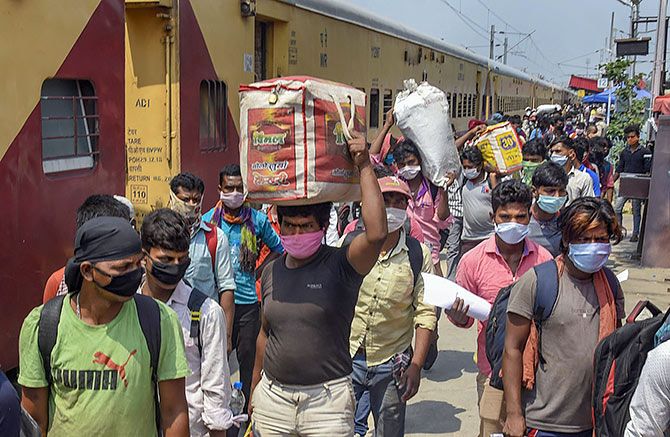
Satyendar Kumar Singh, a migrant worker who returned to his home state, Bihar, from Surat in Gujarat, has no immediate plans to return to his workplace.
"I won't go back to Surat soon. I will decide after five months. This year is gone (in terms of returning to Surat to earn a livelihood). I might return in 2021," says Satyendar, a resident of Bahadur Bigha village under the Haspura block in Bihar's Aurangabad district.
A school dropout, he was employed as a helper at a sari manufacturing factory in Surat.
Currently quarantined at a private women's college near the Haspura block office, Satyendar said returning home was not easy.
"I have been working in Surat for 10 years. The lockdown changed everything. The factory shut down and I was rendered jobless. There was no source of livelihood."
Mohammed Shamshad Khan, another migrant worker, says, "I won't return soon; I will think about it after three or four months."
At the same time, he admits that poor workers like him have no option but to migrate outside the state to earn their livelihood.
"What can I do here except to sit idle without any work? Unlike Andhra Pradesh or Tamil Nadu, there is no opportunity for workers to earn a livelihood in Bihar," says Khan.
"But my family will not allow me to go soon after the lockdown ends. The fear of the coronavirus is such that I too will prefer to stay in my village for now," adds Khan, who worked as a painter in the construction sector in Andhra Pradesh's Chittoor district.
Khan earned Rs 12,000 to Rs 14,000 a month, working eight hours a day for a contractor there.
"After the lockdown began in March, I was lucky. My contractor helped me with rations for April but could not do it in May. I had no choice. I boarded a special train. Otherwise, I would have starved. I paid for the train fare from with my savings," says Khan.
A resident of Raghunathpur village under Haspura block in Aurangabad, Khan is quarantined at a BEd college in Pachrukhiya.
Satyendar and Khan are among the nearly 2 lakh migrant workers who have returned home to Bihar after the lockdown began.
Most of them were rendered jobless after the factories where they worked shut down due to the lockdown.
Many took the Shramik trains. Hundreds of migrants walked hundreds of kilometres or cycled or travelled back to Bihar on trucks and other vehicles.
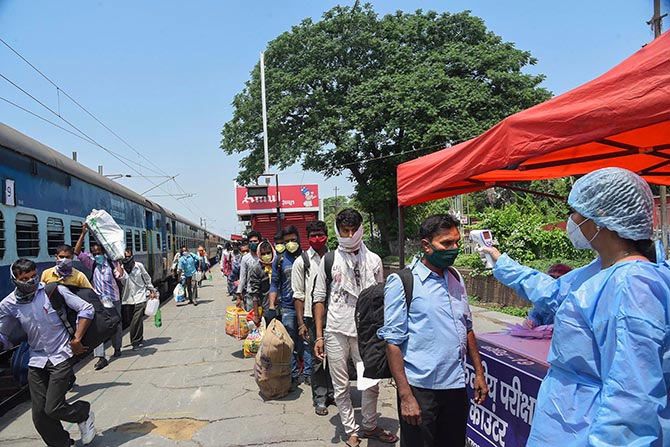
Ram Parvesh, who returned home to Bhagalpur with his wife and four children, no longer knows what the future holds for his family.
Since the last five years, he has been working in a factory in Chandigarh.
"I don't want to go back to Punjab. We faced tremendous difficulty during the last one-and-a-half months. There was no one to help us. I will stay in Bihar and search for livelihood here," says a disillusioned Ram.
The lockdown, he says, has left his children with a bleak future.
The Parvesh family, residents of Sadikpur village under the Naugachia block in Bhagalpur, are currently spending the mandatory quarantine at a government-organised centre.
Ram says they survived on his savings during Lockdown 2.0.
When the third lockdown started, he struggled to provide his family with two meals a day.
"We never want to witness such a situation again. It is better to earn locally. If I get the opportunity to work here, I will never go outside to earn a livelihood. I am happy that I have returned home," he adds.
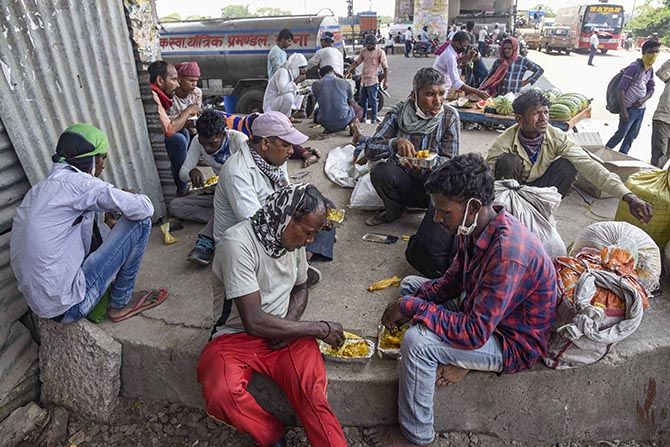
Salam Ansari, a resident of Azamnagar in Katihar district, now under quarantine at a government centre after he reached to Bihar on a special train, says the lockdown has taught him "There is no charm in a big city."
"Poor people like me have more dignity and happiness back home," says Ansari, who worked in a factory manufacturing bags in Mumbai.
He would consider returning to Mumbai only if he is not able to find a job locally.
"I cannot live without earning. I have no land, no other resources to survive. I may go back to Mumbai after life becomes normal by September-October," he adds.
Others echoed what Ram Pravesh and Salam Ansari had to say.
Yogesh Giri, a migrant worker from Baruna village quarantined at a centre in Dinara, Rohtas district, says after the way he and other migrants like him were treated by factory owners, the police and local residents in Gujarat, he will think thrice before returning to work there.
"The lockdown period outside Bihar revealed a new reality. It exposed us to the struggle for survival without any help from anyone, without ration and without money," says Giri.
"No one from the factory where I was working cared to inquire if we were dead or alive and how we were managing without ration and money during the long lockdown," adds Giri, who worked in a factory manufacturing motorcycle parts in Ahmedabad.
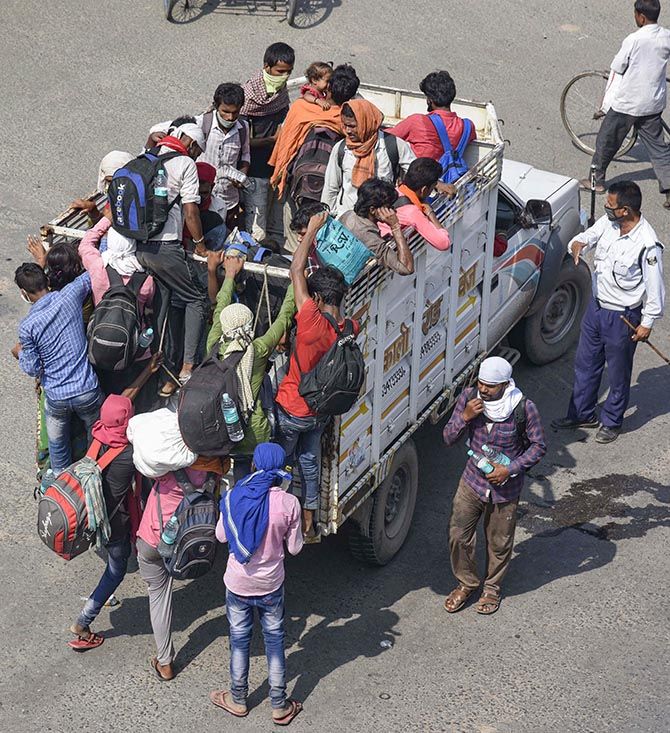
Krushn Kumar, Lal Babu Prasad, Jitendar Kumar reached their home district, Nawada, on May 12. It had taken them a week to walk home from Panipat, Haryana.
All three, who are now at a quarantine centre, were angry that the government had failed to arrange a train or vehicle for them.
"We left our homes to earn money, but, after the lockdown, the factories where we worked shut down. We had no choice but to remain in our small, rented room for over a month," they say.
"We reached a stage where we had no money left. So we decided it is better to return to our village and try and survive there. There was no option left. Finally, it was our home that came to our rescue," says Krushn.
A resident of Pali village under Kawakaul police station in Nawada, he was working at a bed sheet manufacturing unit in Panipat. He admitted there is little opportunity in Bihar to earn a livelihood.
"But I have decided to work here. I will also cultivate small land holdings in the village to support my family. For the time being, I have not made up my mind when to go back to Panipat," he adds.
Triveni Pandey, quarantined at a centre in Gaya, used to work as a daily wage labourer in Surat.
"My meagre savings were exhausted during the lockdown. I had no option but to return home. I was forced to borrow money from others to pay for the train ticket," he says.
"After normalcy returns, I will go back to Surat. Unlike in Bihar, I can earn more money there. There is no shortage of work," he adds.
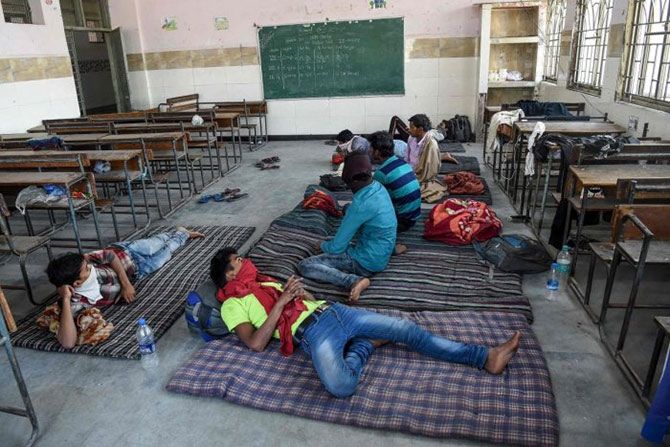
Mohammad Aslam Nawaz, a resident of a village in Madhubani, is waiting for his quarantine period to end so that he can go home.
After the lockdown, he says he will return to his job at a zari embroidery workshop in Hyderabad.
"My owner helped me for nearly two months since lockdown began. How can I say no to him? I will return to work for the man who behaved like a guardian angel when I was facing a difficult time," says Nawaz.
On the other hand, Maheshar Rai, used to work in Delhi, is shaken by the problems he has faced and says he will not leave his village in search of work any more.
Currently spending his quarantine period at a government-mandated centre after returning to his home state on a Shramik train, he says he owns a five bigha plot.
"I will stay in my village and work as a farmer to survive."











